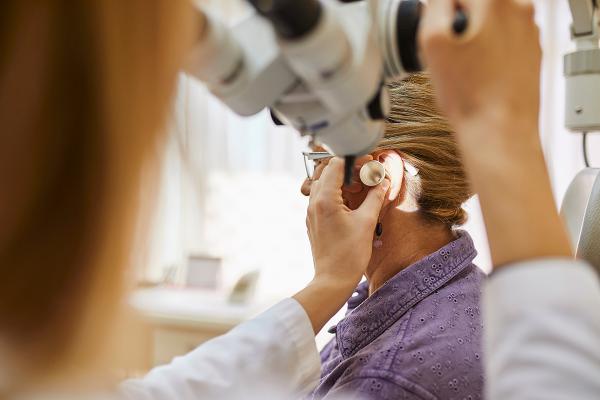
AARP Hearing Solutions helps members access hearing care professionals, no-cost hearing exams and more.
Smoking isn’t just bad for your heart and lungs — it could harm your hearing too. Learn why, plus find tips for quitting.

You’ve probably heard it hundreds of times: Smoking cigarettes is bad for your health. Luckily, the number of smokers in the U.S. has steadily gone down over the past 50 years. But nearly 29 million U.S. adults still smoke, according to the American Lung Association.1
And about 16 million smokers live with some kind of smoking-related disease. That includes cancer, heart disease, lung disease (like COPD) and type 2 diabetes.2
Smoking could also be bad for your hearing. In fact, it’s been linked to a higher risk of hearing loss, according to research.3 Even secondhand smoke can cause ear problems.4
If you or someone you love smokes cigarettes, read on to learn how smoking may affect hearing. Then get tips on how to kick the habit.

AARP Hearing Solutions helps members access hearing care professionals, no-cost hearing exams and more.
The longer you smoke, the higher your chances of developing hearing loss, studies have found. According to one study, women who smoked the equivalent of a pack a day for 20 years or more raised their risk by 30%.5
Experts believe that smoking may affect the cells in the inner ear, damaging them over time. Those tiny cells are called hair cells. They are the ones that send signals to the brain, so you can “hear” sounds.6 There may be other ways that smoking harms hearing as well:
There is some good news. Once you quit smoking, your risk of hearing loss drops. And the longer you stay smoke-free, the lower your risk.3
If you’re a former smoker and suspect you may have hearing loss, consider seeing a hearing care professional. They can give you a hearing exam and consultation. That way, you’ll know if smoking has already affected your hearing. Or you can use the hearing test as a baseline. (If you belong to AARP®, you can request a no-cost hearing exam and consultation through AARP® Hearing Solutions™ provided by UnitedHealthcare Hearing.)
Quitting is never easy. But a combination of tools and tips may help. And it's a good idea to talk to your primary care provider (PCP), who can give you more guidance.
Visit smokefree.gov. This government-run website walks you through a quit plan, outlining the most effective or affordable methods. It also gives tailored advice for women, teens and veterans.
Try medications. There are a variety of effective medications that can help you manage nicotine withdrawal symptoms and cravings. Some are available over the counter, and others need a prescription. Talk with your PCP. Together, you can find an approach that works for you.10
Download an app. The quitSTART app from smokefree.gov helps you track your progress, manage cravings, and find healthy distractions, like games. You can also find inspiration, tips and information to help on your journey.11
Consider counseling. Work one-on-one with a therapist or find a quit-smoking support group. You can also get free confidential coaching through 1-800-QUIT-NOW.10
Keep in mind: There’s no right way to quit. Whatever combination works is the one that’s right for you. The important thing for your health — and hearing — is that you stop smoking.
Ready to request a hearing exam and consultation? AARP Hearing Solutions has a national network of hearing care professionals. Request an appointment.
Sources
Information is for educational purposes only and is not a substitute for the advice of a licensed medical provider. Consult your provider prior to making changes to your lifestyle or health care routine.
AARP Hearing Solutions is available to all AARP members and does not require a health insurance plan from UnitedHealthcare. The AARP hearing program discount cannot be combined with any other discounts, promotions, coupons or hearing aid benefit plans unless noted herein. Products or services that are reimbursable by federal programs including Medicare and Medicaid are not available on a discounted or complimentary basis. AARP commercial member benefits are provided by third parties, not by AARP or its affiliates. Providers pay a royalty fee to AARP for the use of its intellectual property. These fees are used for the general purposes of AARP. Some provider offers are subject to change and may have restrictions. Please contact the provider directly for details. UnitedHealthcare Hearing is provided through UnitedHealthcare, offered to existing members of certain products underwritten or provided by UnitedHealthcare Insurance Company or its affiliates to provide specific hearing aid discounts. This is not an insurance nor managed care product, and fees or charges for services in excess of those defined in program materials are the member's responsibility. UnitedHealthcare does not endorse nor guarantee hearing aid products/services available through the hearing program. This program may not be available in all states or for all group sizes. Components subject to change.
Network size varies by market.